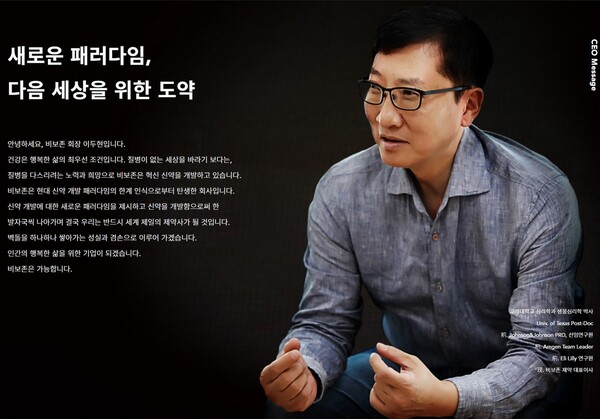
Vivozon Pharmaceutical’s Chairman Lee Doo-hyun, whose company is developing non-narcotic painkiller opiranserin (VVZ-149), has issued a strongly worded statement to its shareholders and employees.
Last Wednesday, the company posted a statement on its website last month in the name of Chairman Lee.
"For the past two years, we have been working hard to improve Vivozon Pharm’s corporate health through excruciating efforts, resulting in many changes,” Lee said. “After spending considerable time, we have completely shed the unlicensed manufacturing issue, stabilizing our organization and system.
In the process, the company faced an absurd situation of an external auditor refusing to make its opinion on its half-yearly report, Lee recalled. However, Vivozon overcame that crisis through the efforts of the entire company, he emphasized.
“Vivozon Pharm turned around to a surplus in the second quarter of this year. And I have stepped down as its CEO to focus on my primary task of launching opiranserin," Lee said.
Seemingly aware of the criticisms about the delayed application for getting opiranserin’s approval despite the completion of its p3 clinical trial, Lee insisted that Opiranserin’s approval process is proceeding normally.
"We put a lot of effort into setting up the marketing strategy for opiranserin. In early August, we finally submitted a preliminary review application to the Ministry of Food and Drug Safety," Lee said. "There is a maliciously negative view in some circles that we have not yet applied for a marketing authorization. However, I want them to know that a preliminary review is part of a marketing authorization application, which means that the review of documents for a marketing authorization has already begun."
Chairman Lee went on to elaborate on the alleged delay.
"We have been working hard to establish a marketing strategy before and after the launch of opiranserin. Now that the direction has been established, we are preparing materials," he said. "Since we provide information to medical professionals, we need to put more effort into preparing them. All of these processes are being prepared with marketing experts."
Besides, Lee explained that the company continues to examine technology transfer. Still, the process is slowing down due to the summer holidays at home and abroad, and we expect to resume discussions in earnest this month.
"We have been developing opiranserin in earnest since 2011 and have received many evaluations from numerous organizations and committees, including government agencies. There were numerous negative assessments despite receiving 7.5 billion won ($5.6 million) in research funding from the Korea Health Industry Development Institute over seven years. There were some constructive negative evaluations, but many were blind accusations without evidence. In short, it was an unconditionally negative evaluation with no logic and no evidence," he said.
Lee then stepped up his accusation of what he termed “blind critics.”
"Even now, we are dismayed by the number of negative, no-questions-asked criticisms of Opranjerin at this stage of its development. However, we cannot respond to such unfounded criticisms by pointing fingers. I don't think we should be caught up in such a situation."
Lee went on to say, "There is a saying, ‘Even if you twist a chicken's neck, the dawn will still come.’ We apologize to our shareholders who have to wait for a difficult and painful time until then. I believe that if we respond proactively and work with our shareholders, we will eventually be able to show them good news and results. I hope they will continue to trust and support me and our company and not be swayed by rumors without logic or basis."
However, the statement did not mention or apologize for the recent rebate scandal involving Vivo Pharmaceutical. A few days before the statement was released, the Korean Fair Trade Commission (KFTC) imposed a corrective order and fine on the company for the rebate scheme uncovered during its probe into Inist Biopharmaceutical.
According to the KFTC, Vivozon’s sales representatives paid money to hospitals and clinics in Seoul to prescribe its drugs from August 2016 to July 2019. The payment amount was calculated by multiplying monthly prescriptions by a certain percentage.
Vivozon paid sales expenses (or sales budgets), a promotional outlay, to its sales representatives to pass the money on to hospitals and clinics as rebate funds. It concealed the payment of sales expenses by claiming false receipts not used by the sales representatives.
"These rebates are unfair acts that hinder the competitive order, as the company, which should have secured customer demand through competition on the merits, such as price and quality, secured customer demand by providing improper profits," the antitrust watchdog said.
The KFTC further explained the background for its disciplinary move.
“Due to the nature of the specialty drug market, where consumers cannot purchase drugs directly, doctors' drug selection depends on the size and number of rebates and other unfair profits, rather than the price or quality of the drug,” it said. “That results in a distorted structure where the most suitable product for the patient is not selected in the market, and the damage is ultimately passed on to the consumer."
Related articles
- Vivozon applies for preliminary review for non-narcotic painkiller
- Can non-narcotic painkillers curb fentanyl overuse?
- Vivozon’s non-narcotic painkiller proves benefit in phase 3 study
- Vivozon wins regulatory nod for 1st phase trial of drug addiction treatment
- Vivozon to cut prices of 45 drugs due to Inist Biopharma’s illegal rebates before acquisition

